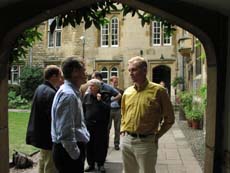index
Grammars and retrospective constructions
click on images for full-size:



Mutual avowal of norms (traffic signs and parade, Charlottesville, Virginia

Mutual avowal of norms (Hegelians conversing at Oxford)
Even if grammars were retrospective constructions or self-interpretations, often they get picked up and codified into laws or manuals of etiquette or institutional practices. They get referred to; they become the objects of conscious change or defense.But if they can function to guide action after being retrospectively formulated, then the same question arises about how their then retrospectively codified meaning systems influence behavior, and this suggests that the initial objection may be wrong, that there can be organizations of meaning, call them in this case social grammars, already influencing behavior on the first level, prior to their conscious formulation. And, if we add to this the argument that social life demands the avowal of shared norms (and so shared social grammars) we seem to have avoided the worst of the objection. Not by denying it outright, but by pointing to the social self-awareness that picks up one or another translation manual.